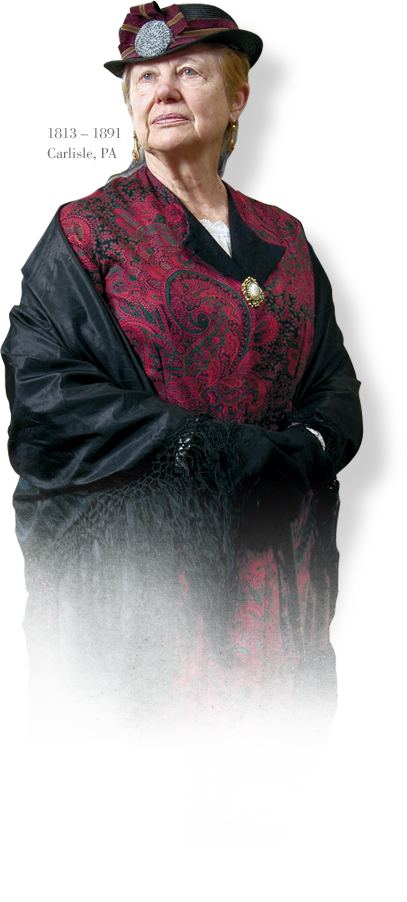Sarah McKim
Her Story
Sarah McKim was the wife of James Miller McKim, a prominent abolitionist and Presbyterian minister, who also served as editor for the Pennsylvania Freeman. Sarah was born in Carlisle, PA. Her maiden name was Sarah Allibone Speakman and she married James McKim on October 1, 1840. A brilliant young lawyer, James McKim was frequently called to represent free men and freed men kidnapped across the border into Maryland. He was most famous as the secretary of the Pennsylvania Abolitionist Society and was prominently featured along with William Stills in the renowned illustration of the arrival of Henry ”Box” Brown.
Like her husband, Sarah McKim was a strong supporter of the anti-slavery movement and some of her friends and associates included Lucretia Mott, William Lloyd Garrison, Frederick Douglas, Harriet Tubman and Frances Harper. Sarah and her husband became influential supporters of the underground railroad organizations centered in Philadelphia also assisting in the many court cases that emerged after the passage of the Fugitive Slave Law. They would make trips to various cities in Pennsylvania from Pittsburg to Philadelphia and Gettysburg to Erie representing the Pennsylvania Abolitionist Society to assist in legal cases and speak on behalf of those who were being persecuted and needed support. Additionally, through her role as an officer in the women’s anti-slavery movement, Sarah met abolitionist Mary Peck Bond with whom she forged a lifetime friendship as her husband did with William Peck.
In 1859, with the impending execution of abolitionist John Brown, the McKims lent their support to his wife, Mary Brown and traveled with her to Virginia. Sarah and James prayed and held hands with Mary until the hour of John’s execution had passed. Afterward, the McKims and Frances Harper assisted Mary in claiming her husband's body and escorted her northward, for the funeral service and interment.
Sarah also lent her support during the trial of William Stills and 5 Black dock workers, accused of helping in the liberation of Jane Johnson, an enslaved Southern woman who asked for help in obtaining her freedom while passing through Philadelphia with those she served. Jane made an appearance in the courtroom as surprise witness escorted by Sarah McKim and a cadre of female abolitionists such as Lucretia Mott, Sarah Pugh, and Rebecca Plumly. Jane testified that she had not been forcibly abducted by Stills and the other men, but that she had sought freedom out of her own volition. Still and the other 5 men were acquitted.
During the Civil War, Sarah McKim’s husband founded the Philadelphia Port Royal Relief Committee to help provide for the liberated freedom seekers of Port Royal. The organization became statewide in 1863 as the Pennsylvania Freedman’s Relief Association. He also became actively involved in the authorizing and the recruiting of African-American units to the Union Army. Two years later, The McKims moved to New York City when James became the first secretary of the new American Freedman’s Union Commission, which operated until 1869. He also helped to found The Nation, a New York newspaper produced to support the interests of the newly freed men and provided Wendell Garrison the position of editor.
James and Sarah had two natural children, Charles Follen and Lucy; the couple also adopted James’ niece. Lucy McKim later married Wendell Phillips Garrison, son of William Lloyd Garrison, while the adopted niece became William Garrison’s second wife. Eventually, the McKims relocated to Orange, New Jersey, where James died in 1874. Sarah also stayed in New Jersey until her death in 1891.
In addition to abolitionist causes, Sarah McKim was a strong supporter and advocate for women’s rights, children’s rights and animal rights. One of Sarah’s favorite anecdotes is that of a woman named Dolly from Chambersburg, who boldly stood on her porch with a U.S. flag as her petticoat, which she flashed to the confederates as they rode by. The confederates merely tipped their hats to her and rode on.

